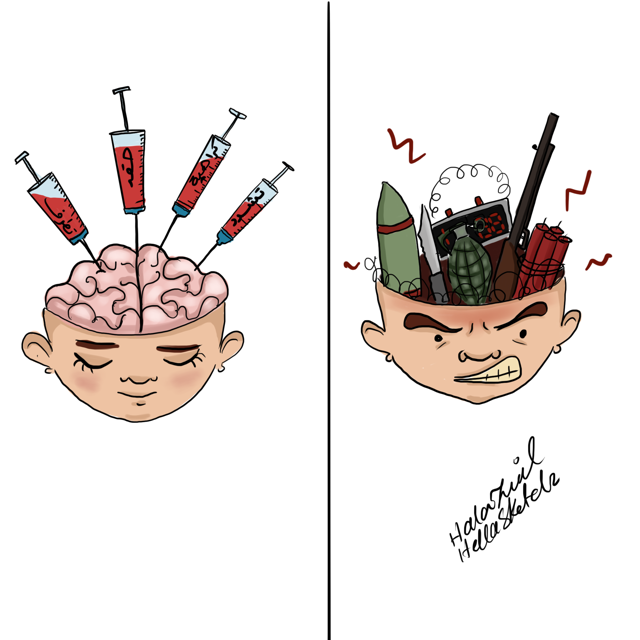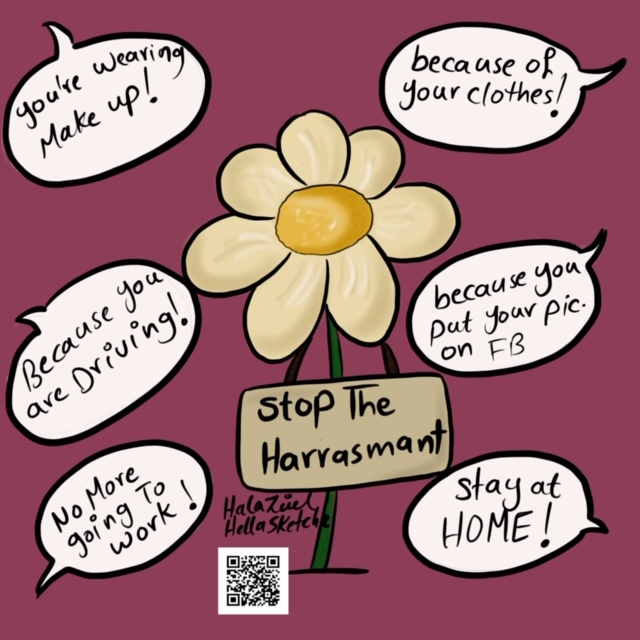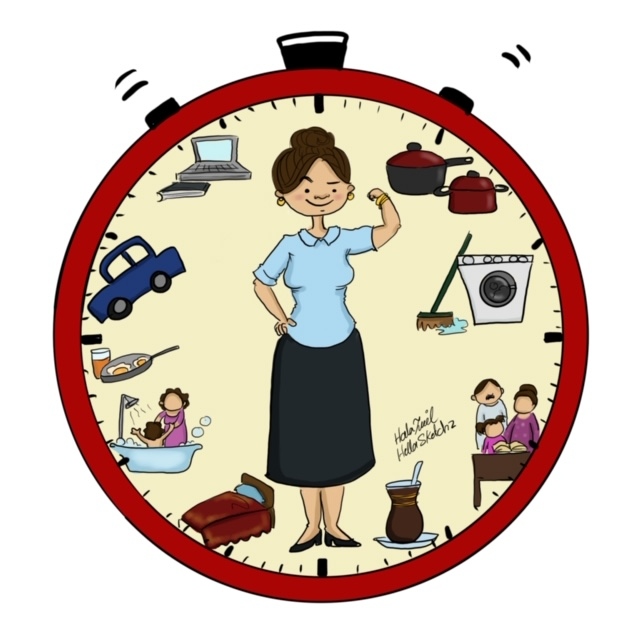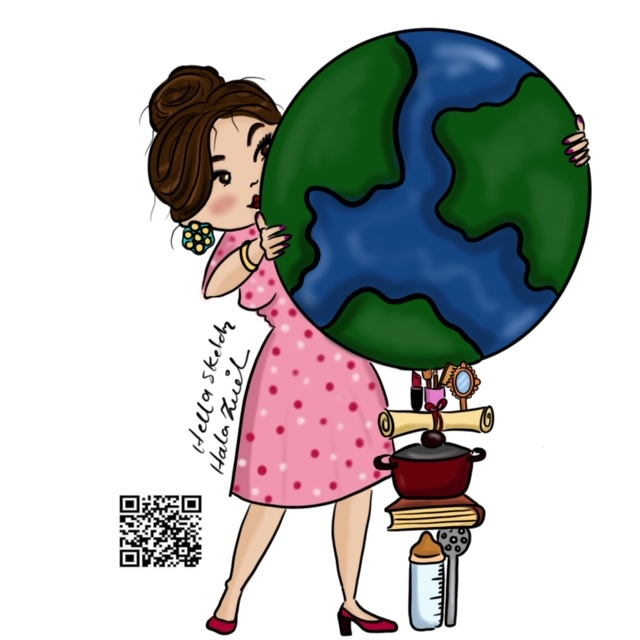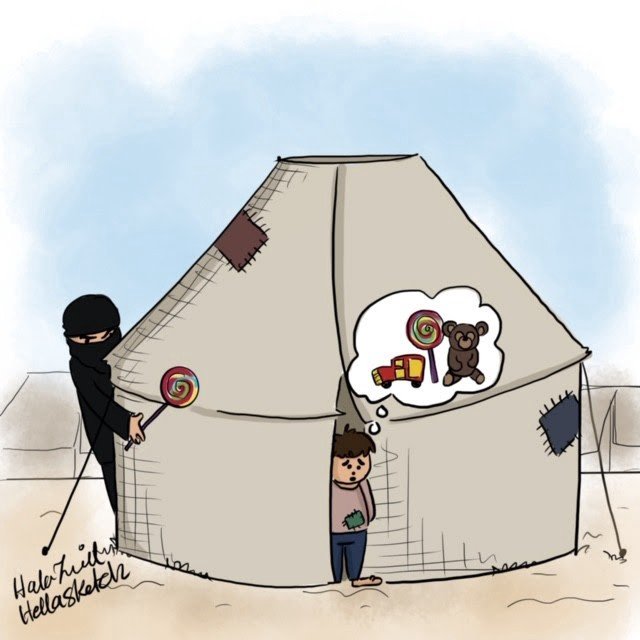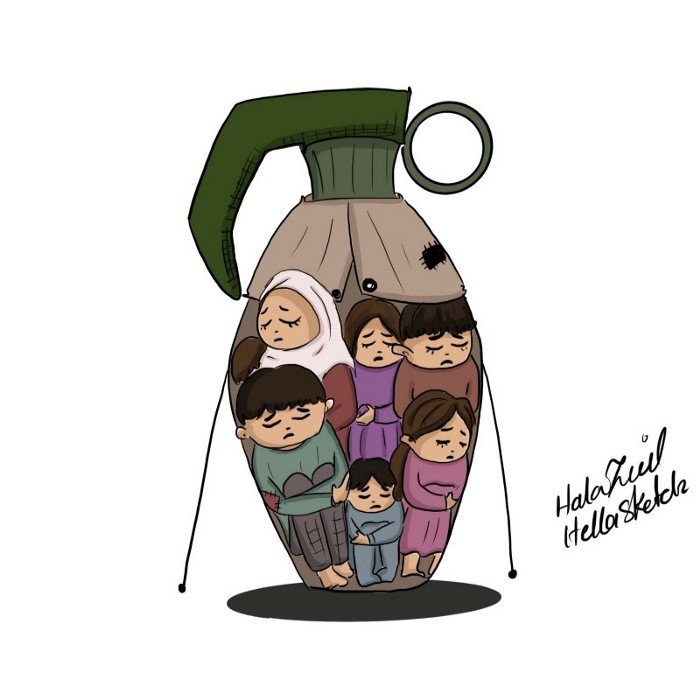Hella Sketchz: How an Iraqi Artist Captures Complexity with Cartoons
Story by Hala Ziad, Written by Naz Hussein, Edited by Dainelis Rodriguez
Hala Ziad was born in 1986 in Baghdad, Iraq. She graduated from Baghdad University with degrees in economy and administration from the Department of Statistical Science. After moving to the United States in 2016 as a refugee, Hala decided to pursue her true passion as an artist. Hella Sketchz, her cartoonist project, was launched in 2017 on social media. Through her caricatures, Hala addresses various issues in Iraqi society and beyond. Find Hella Sketchz on Instagram and Facebook.
I started drawing when I was a kid, with inspiration from my mother. As a teenager, I led a normal life and attended Baghdad Secondary School, where I honed my English language skills. But when I went to college and began my adult life, I didn’t have time or energy to be creative.
Suddenly, my father, mother, and brother moved to North Carolina in the United States as refugees. In 2015, my mother was diagnosed with stage four breast cancer and received treatment abroad. By the end of the year, she passed away. I wasn’t by her side because the paperwork process to enter the country was arduous and lengthy. By the time that my reunification application was accepted, a year had already gone by.
Moving to the United States meant transitioning to a completely different environment. I left behind my social circles, family, and daily schedule. Even so, my affinity for art never diminished. To occupy my free time, I started drawing again. Instead of being in my own bubble, I rediscovered my creative outlet. It was therapeutic.
In 2017, I started my caricature art on a social media page called Hella Sketchz. Initially, my work was light-hearted and humorous, with comics depicting mundane activities: a brother bothering his sister, a mother’s duties at home, etc… Everything inspired me: a Facebook post, a story, or a phone call with a friend.
Gradually, I began addressing real struggles and societal issues in Iraq. I specifically advocated for women’s rights and took stances against domestic abuse. I also covered a wide range of topics happening in Iraq, from political, social, and economic, adopting a people’s power approach. I consistently kept up with the news, so I could portray current events accurately.
The momentum increased during the 2019 October Revolution, where I created two sketches per day. My work spread everywhere, so that’s what I became known for. I gained a bigger following, but I also became a target for attackers and cyberbullies. Social media pages posted false information about my views, while other people left hateful messages and comments. These things sometimes make me reconsider returning home, because I know I’m on someone’s computer.
Despite the concerning threats, I remained committed to the cause. I needed to be an outspoken artist. It’s harder for my people to be vocal, so I felt responsible to make my sketches powerful. For example, I worked with the UN to raise awareness about the rights of arrested people in Iraq. Even if arrested, they need to understand the human rights they’re entitled to. I also helped build COVID-19 awareness during this project.
In Charlotte, I worked with the Carolina Refugee Resettlement Agency to support and advocate for refugees. I also collaborated with civil society organizations in Iraq on a social media campaign about people directly affected by ISIS. The campaign focused on the reintegration of internally displaced people and the children of ex-terrorists during the post-ISIS era. Oftentimes, liberated families returned home to find nothing intact. Currently, the children of ex-terrorists remain in camps like ticking bombs: their exclusion from society encourages a move towards extremism. That’s why the campaign was really essential, with messages of solidarity, unity, and community. Needless to say, handling such sensitive material taught me how to engage controversial topics with my audience.
My journey has been long, difficult, and rewarding at the same time. I truly built Hella Sketchz from scratch, relying on social media for marketing and promotion. In the beginning, social media pages plagiarized my work during a time where I needed exposure. Yet, I continued to push towards forming a real audience without sponsors or money. I wanted my following to be attracted to my artwork, and nothing else, so I remained anonymous. Only after two years did I disclose my identity.
Nowadays, my work is receiving recognition. My comics have been featured in famous newspapers and magazines, and I’ve been hosted on television with popular channels. My family has supported my artistic endeavors, a beautiful blessing.
Translation: The left hand on the top reads “society”, which pushes away a tent while the right hand on the bottom reads “terrorism”.
Even so, my success is accompanied by an opposition of cyberbullies. They are angered by my messages and invalidate my caricatures because I am outside of Iraq and the Middle East. To them, I should not speak about issues in Iraqi society since I no longer live there. But I believe I have an inherent responsibility to raise awareness about collective issues and promote human rights. Through my comics, I can achieve this easily and in a digestible manner.
Art is a formula for education. It makes people’s minds move.
I hope to keep expanding my work, uplifting people’s voices, and spread globally. My message to everyone, especially migrant women, is to pursue your passions, receive an education, and plan your life by yourself, for yourself.
Translation: Two children of ex-terrorists stand at a crossroads. The left side arrow reads “Deviation and terrorism” while the right side arrow reads “integration and society”.
Disclaimer: The views, information, or opinions expressed in this article are those of the author and do not necessarily represent those of WeaveTales and its employees.
Want to tell your story?
For more information contact our editorial admin at contact@weavetales.org.


